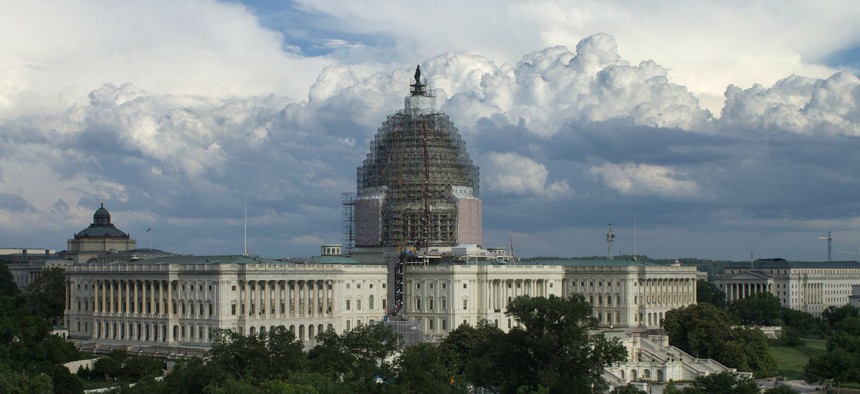
Architect of the Capitol file photo
The Reports Most Lawmakers Don’t Want You to See
Open-government groups demand transparency, but Congress has other ideas.
A long-simmering debate continues over whether the in-depth reports prepared for lawmakers by the Congressional Research Service should be published -- just as reports by the Government Accountability Office and Congressional Budget Office are made public.
On June 17, The New York Times revived the issue in an editorial titled “Congressional Research Belongs to the Public.” It cited the nonpartisan high quality of reports written in plain English, which Congress—since the CRS’s founding in 1952—has reserved for itself in what the Times calls “an in-house think tank for lawmakers.”
“Some of these reports are made available to people who know where to look, like diplomats, lobbyists and reporters,” the editorialists wrote. “Constituents can get them from congressional offices if they know what to ask for. Some private groups, like The Federation of American Scientists, post a selection on their websites. But access is very haphazard.” Several private businesses offer the reports at a steep price.
Reps. Leonard Lance, R-N.J., and Mike Quigley, D-Ill., in January introduced a bill to require CRS to publicly release its wares, which drew backing from an array of library groups and transparency advocates.
Steven Aftergood, the blogger on secrecy issues at the Federation of American Scientists, noted that CRS’ staff of 600 (with a $107 million budget) receives 62,000 requests for custom analysis and research for individual members or committees.
He pointed out that a switch to open publication of CRS’s work is backed by the nonprofit Project on Government Oversight, even though its recently retired military analyst Winslow Wheeler warned of a downside. “Officially writing for public consumption can . . . mean that the sometimes technical nature of CRS work will likely be dumbed-down for public consumption,” Wheeler wrote. “It could also mean thickening the bureaucracy at CRS if managers there get the notion they are writing for the public, not directly for staff in Congress.”
On July 2, retired CRS staffer Bob Lyke published a letter in the Times warning that publishing the reports for all comers would do more harm than good while adding to the time it takes staff to produce them. CRS “analysts consult with members of Congress and staff of both parties, conservatives and liberals alike, sometimes with short notice,” he wrote. “Protecting that relationship, which is not perfect but better than outsiders imagine, should be the principal consideration in deciding whether reports are made public.”
Others familiar with CRS note that the agency is not staffed to respond to public inquiries and it would need additional funding to redesign its website to bring the reports out from behind a firewall that currently is accessible only to House and Senate members and staff. What’s more, CRS researchers pay to subscribe to many commercial publications and databases that charge fees based on site licenses for limited numbers of users—costs that would rise if the general public were factored in.
Still, the cordoned-off and “risk-averse” CRS team, as alumni Lyke put it, would hop to if Congress were to change its own policy and let a thousand CRS reports bloom in the public square. The agency takes no public position on the question.
NEXT STORY: The Must-Pass Highway Bill Dominates Jammed July







